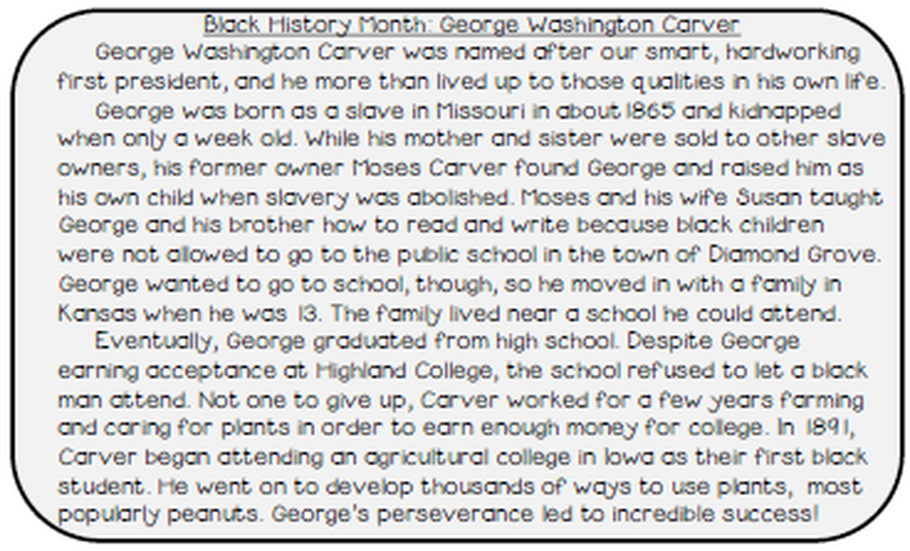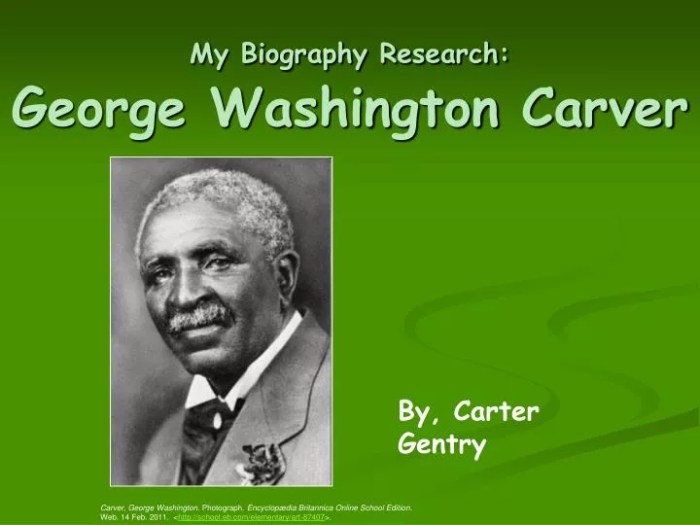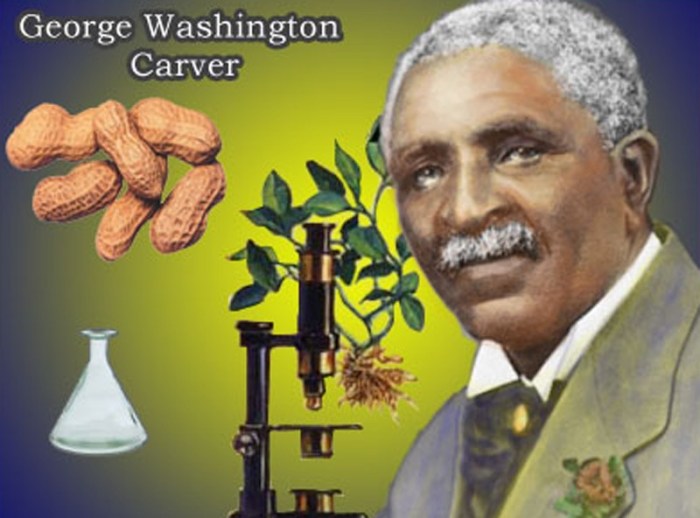The George Washington Carver Answer Key unveils a captivating exploration into the life and legacy of an extraordinary scientist and humanitarian. Delving into his groundbreaking research, agricultural advancements, and unwavering commitment to social justice, this comprehensive guide illuminates the enduring impact of a visionary whose contributions continue to inspire generations.
George Washington Carver’s Early Life and Education

George Washington Carver was born into slavery in Diamond Grove, Missouri, on January 1, 1864. His early life was marked by challenges and hardship, but he also showed a keen interest in learning and a passion for nature.
Carver’s parents were Moses and Mary Carver, both enslaved African Americans. When Carver was an infant, his father escaped from slavery, leaving his mother and children behind. Mary Carver and her children were sold to a neighboring plantation, where they faced harsh conditions and limited opportunities.
Education and Influences
Despite the challenges of his upbringing, Carver showed a strong desire for knowledge. He attended a local school for African American children, where he excelled in his studies. He also spent countless hours exploring the natural world, collecting plants and insects and studying their properties.
Carver’s early education was greatly influenced by his teachers, particularly Miss Susan McHenry. McHenry recognized Carver’s potential and encouraged him to pursue his interests in science. She also helped him to secure a scholarship to Simpson College in Indianola, Iowa, where he studied botany and agriculture.
Carver’s Scientific Contributions: George Washington Carver Answer Key

George Washington Carver’s scientific contributions were groundbreaking and had a significant impact on agriculture and industry. His research on peanuts and sweet potatoes revolutionized farming practices and led to the development of new products.
Research on Peanuts and Sweet Potatoes
Carver’s research on peanuts focused on finding new uses for this crop. He developed over 300 products from peanuts, including food, beverages, cosmetics, and industrial materials. His work helped to establish the peanut as a valuable cash crop for farmers.
Carver also conducted extensive research on sweet potatoes. He developed new varieties of sweet potatoes that were more resistant to disease and had improved nutritional value. He also developed methods for using sweet potatoes to make flour, starch, and syrup.
Crop Improvement and Soil Conservation, George washington carver answer key
In addition to his research on peanuts and sweet potatoes, Carver also developed innovative methods for crop improvement and soil conservation. He advocated for crop rotation to improve soil fertility and prevent erosion. He also developed techniques for terracing and contour plowing to reduce soil erosion.
Carver’s work on crop improvement and soil conservation helped to preserve the productivity of agricultural land and ensure the sustainability of farming practices.
Carver’s Role in Agriculture

George Washington Carver dedicated his life to improving agricultural practices and promoting sustainable farming methods. His work had a profound impact on the agricultural industry and the lives of farmers, particularly in the southern United States.
Promoting Agricultural Sustainability
Carver recognized the importance of preserving soil fertility and preventing soil erosion. He developed innovative crop rotation techniques that alternated nitrogen-fixing legumes with other crops, such as cotton and peanuts. This practice helped replenish the soil’s nitrogen content, reducing the need for chemical fertilizers and improving soil health.
Improving Farming Practices
Carver conducted extensive research on various crops, including peanuts, soybeans, and sweet potatoes. He developed new and innovative uses for these crops, creating value-added products such as peanut butter, soy milk, and sweet potato flour. These innovations not only provided farmers with additional income streams but also improved the nutritional value of the crops.
Establishing Agricultural Schools
Carver believed that education was essential for farmers to adopt sustainable practices. He established several agricultural schools, including the Tuskegee Institute’s School of Agriculture, where he taught farmers about soil conservation, crop rotation, and other innovative techniques.
Educating Farmers
Carver traveled extensively throughout the South, conducting workshops and demonstrations for farmers. He shared his knowledge of sustainable farming practices, crop diversification, and the importance of soil conservation. His efforts helped farmers improve their yields, reduce their reliance on chemical inputs, and increase their profitability.
Carver’s Legacy and Impact

George Washington Carver’s legacy extends far beyond his scientific discoveries. He was a passionate educator and humanitarian whose work continues to inspire generations of scientists and activists. Carver’s influence on modern agriculture is undeniable. His research on crop rotation, soil conservation, and the development of new crops helped to revolutionize farming practices and improve the lives of countless farmers.
Carver’s Enduring Legacy as a Scientist and Educator
Carver’s scientific contributions have had a profound impact on the field of agriculture. His discovery of over 300 uses for peanuts and sweet potatoes led to the development of new industries and products. His work on crop rotation and soil conservation helped to improve agricultural yields and reduce erosion.
Carver was also a gifted educator who taught at Tuskegee Institute for over 40 years. He inspired countless students to pursue careers in science and agriculture.
Carver’s Contributions to the Fight Against Poverty and Hunger
Carver was a tireless advocate for the poor and hungry. He believed that everyone deserved access to nutritious food and worked to develop affordable and sustainable solutions to food insecurity. Carver’s research on peanuts and sweet potatoes helped to provide nutritious food for millions of people around the world.
He also developed new methods for preserving and storing food, which helped to reduce waste and improve food security.
Carver’s Personal Life and Values
George Washington Carver lived a life of humility, compassion, and service to others. He held a deep faith in God and believed that his scientific work was a way of serving humanity. Carver’s personal experiences, including his childhood as a slave and his struggles as a young scientist, shaped his values and influenced his scientific work and social activism.
Beliefs and Values
- Carver believed in the inherent dignity and worth of all people, regardless of their race, gender, or social status.
- He was a strong advocate for education and believed that it was the key to unlocking human potential.
- Carver was a lifelong vegetarian and believed in the importance of a healthy diet and lifestyle.
Humanitarian Efforts
Carver was deeply involved in humanitarian efforts throughout his life. He established the Tuskegee Institute’s Agricultural Extension Service, which provided farmers with practical advice and training on how to improve their crops and livestock. Carver also worked to improve the lives of African Americans in the South by promoting education, health, and economic development.
Carver’s Impact on Society

George Washington Carver’s impact on American society extended far beyond his scientific contributions. He was a prominent public figure who used his platform to advocate for social justice and promote education and opportunity for all.
Advocacy for Social Justice
Carver was a vocal critic of racial discrimination and segregation. He spoke out against lynching and other forms of violence against African Americans. He also worked to improve the economic conditions of African Americans by promoting agricultural education and encouraging them to become landowners.
Education and Opportunity
Carver believed that education was essential for the advancement of African Americans. He established the Carver School of Agriculture in Tuskegee, Alabama, which provided vocational training to African American students. He also worked with other organizations to promote education and opportunity for all.
Questions Often Asked
What were George Washington Carver’s most significant scientific contributions?
Carver’s groundbreaking research focused on developing innovative uses for peanuts and sweet potatoes, leading to the creation of over 300 products.
How did Carver promote agricultural sustainability?
Carver emphasized crop rotation, soil conservation, and the use of cover crops to improve soil health and crop yields.
What role did Carver play in education?
Carver established agricultural schools and taught farmers about sustainable farming practices, empowering them to improve their livelihoods.